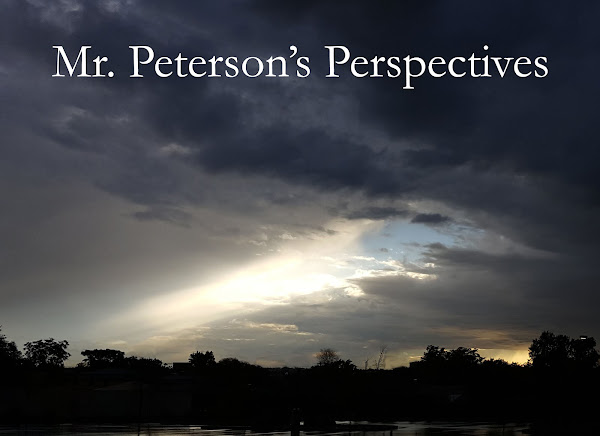Friday, April 11, 2014
Mr. Peterson's 2014 Voting Record
Yes folks, it's that time again where accountability and transparency converge to produce my voting record from this past session for your perusal. May you enjoy. And to my political opposition this election year who may be grasping for any information they can get their hands on, you are welcome too.
Thursday, April 3, 2014
VETO OVERRIDE: Putting Teeth In Toothless Legislative Subpoenas
Governor Herbert recently vetoed HB414 which would have strengthened Legislative Subpoenas. This strengthening effort occured in light of the Legislature's frustrating experience dealing with former Attorney General John Swallow's legal council and their disregard for such subpoenas. That disregard delayed the investigation and cost the taxpayers hundreds of thousands of dollars.
Here is the Governors released statement regarding his veto:
The governor does not question the Legislature’s authority to seek information through subpoenas and to conduct investigations. The governor recognizes the bill was passed in response to the investigation of former Attorney General John Swallow, and was a result of the frustration the Legislature experienced in conducting that investigation. While sympathetic to that frustration, the governor believes history has repeatedly shown that government response to scandals is all too often excessive and overreaching.
“Regardless of the motives for passing HB 414, I cannot sign a bill that demands information of anyone, at any time, on any subject, for any purpose, and denies our citizens their fundamental constitutional rights of defense and due process,” said Gov. Herbert.
In response to this, the bill sponsor, Representative Jim Dunnigan, has released this statement:
After reading through the governor’s veto letter, and talking to legislative legal counsel, here a few thoughts fromRep. Jim Dunnigan about House Bill 414.
1. The veto letter claims that HB414 “demands information from anyone, at any time, on any subject, for any purpose.” This is not an accurate characterization of what the bill does. Under current law, the Legislature’s subpoena power is already broad in order to allow the Legislature to gather the information needed to enact good law. HB414 only deals with the process for enforcing a legislative subpoena. It does not expand the Legislature’s subpoena power.
2. The veto letter claims that HB414 “criminalizes any attempt by an individual to seek relief from anyone other than the legislative body itself. . . ” That is incorrect. The bill simply states that if someone tries to challenge a legislative subpoena in a forum other than the legislative forum provided in HB414, the person is not excused from the obligation to comply with the subpoena and is subject to criminal penalties for failure to comply with the subpoena. HB414 does not criminalize anything other than failure to comply with a legislative subpoena.
3. The governor’s veto letter expresses concerns that the “final version of HB 414 did not have a committee hearing in either the House or the Senate . . . “ While this is technically correct, the reason for this is that changes were made to the bill, after committee hearings, in response to concerns raised by interested parties, including the governor’s office. The process used in the passage of HB414 is common and resulted in changes being made to address concerns raised during the time that the bill was being considered.
4. The veto letter claims that HB414 “denies our citizens their fundamental constitutional rights of defense and due process” and “violates the open courts provision of the Utah Constitution by denying citizens the ability to seek redress in the courts.” We respectfully disagree. Due process essentially requires that a person be given notice (of government action and hearings relating to that action) and an opportunity to have the person’s position heard. The open courts provision of the Utah Constitution has been interpreted to prohibit the government from taking away the right of a person to pursue certain matters in court. This provision is not violated if an adequate alternative method for hearing a grievance is provided. HB414 provides an alternative method by allowing a subpoena to be challenged before a bi-partisan legislative review committee. This helps protect against a subpoena being issued for political reasons. Under HB414, the due process rights of a person who challenges a subpoena are preserved because the person has an absolute right to have their objections heard before a bi-partisan committee.Though, under HB414, a person who challenges a legislative subpoena does not have the right to appeal the decision of a legislative review committee to a court, a legislative subpoena can only be enforced in court. HB414 provides two avenues to enforce a subpoena. One is criminal in nature and one is civil.A person is guilty of a crime under HB414 only if the person refuses to comply with a legislative subpoena after the person has an opportunity to exercise the person’s due process rights before a legislative review committee. In that event, the matter would still need to be brought before a criminal court where the defendant would be able to raise any claim that the subpoena violated the defendant’s constitutional or legal rights.In order to enforce a legislative subpoena civilly, the Legislature would be required to file an action in court and the person who is subject to the subpoena could then challenge the subpoena as part of that court action.Thus, under HB414, it is impossible for a legislative subpoena to be enforced without the involvement of a court.
Rep. Dunnigan is the sponsor of House Bill 414, and was the chairman of the House special investigative committee that delved into allegations against now-former attorney general John Swallow.
Representative Dunnigan is one of the most thorough and rigorous policy makers I know. His arguments are sound; and thus, I support an Override Session to make our Legislative Subpoenas effective and meaningful tools for investigating corruption within our government.
Subscribe to:
Posts (Atom)


